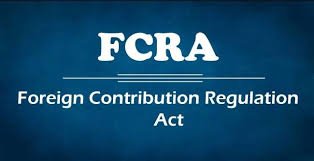Cancellation of FCRA License of International Cooperative Alliance: An Overview
The International Cooperative Alliance (ICA), a prominent global organization representing cooperative enterprises, has had its Foreign Contribution Regulation Act (FCRA) license canceled by the Indian government. This decision has significant implications for the organization, which focuses on promoting and supporting cooperatives across various sectors.
Background of the Cancellation
The cancellation of the ICA’s FCRA license stems from various compliance issues related to the use of foreign funds. The Ministry of Home Affairs (MHA) has highlighted discrepancies in the organization’s financial activities, leading to the revocation of its license. The ICA has been a key player in advocating for the rights and interests of cooperatives in India and worldwide, making this decision a crucial turning point for its operations.
Impact on Cooperative Organizations
The cancellation of the FCRA license affects not only the ICA but also the numerous cooperative societies that rely on its support. These organizations often depend on foreign contributions for developmental projects, capacity building, and international collaboration. The revocation of the license could hinder their ability to access essential funding and resources, potentially stalling growth and innovation within the cooperative sector.
Government’s Stance on Compliance
The Indian government has reiterated its commitment to ensuring that foreign contributions to organizations operating within its borders adhere to established regulations. The cancellation of the ICA’s license serves as a reminder for organizations to maintain transparency and compliance with the FCRA. This step is part of a broader initiative to scrutinize the financial dealings of NGOs and international bodies operating in India.
Conclusion: A Turning Point for the ICA
The cancellation of the FCRA license for the International Cooperative Alliance marks a significant development in the relationship between the Indian government and international organizations. As cooperatives in India navigate this challenge, they must adapt to the changing regulatory environment to continue their mission of fostering sustainable development through cooperative principles.

Why This News is Important
Impact on Cooperative Sector
The cancellation of the ICA’s FCRA license is a pivotal moment for the cooperative sector in India. As a leading advocate for cooperatives, the ICA’s inability to receive foreign contributions could diminish the capacity of local cooperatives to engage in international partnerships and development projects. This shift may slow the progress of innovative cooperative initiatives that rely on foreign funding.
Regulatory Compliance and Transparency
This incident underscores the importance of regulatory compliance and financial transparency for organizations operating in India. The government’s actions highlight the need for NGOs and international bodies to strictly adhere to the FCRA and other regulations. It serves as a cautionary tale for similar organizations regarding the consequences of non-compliance.
Future of Foreign Contributions
The cancellation raises questions about the future of foreign contributions to cooperative organizations in India. It could lead to a reassessment of funding strategies and a potential reevaluation of partnerships with international bodies. The cooperative sector must find ways to diversify funding sources while maintaining compliance with Indian laws.
Historical Context
The Foreign Contribution Regulation Act (FCRA) was enacted in India in 2010 to regulate the acceptance and utilization of foreign contributions by NGOs and other organizations. The Act aims to ensure that foreign funds are not used for activities that could threaten national security or public order. Over the years, the Indian government has been vigilant in monitoring compliance with the FCRA, leading to the cancellation of licenses for several organizations due to non-compliance. The International Cooperative Alliance has played a significant role in promoting cooperative values and principles worldwide, and its activities in India have contributed to the growth of the cooperative movement. However, the recent cancellation of its license underscores the government’s commitment to ensuring transparency and accountability in the utilization of foreign contributions.
Key Takeaways from “Cancellation of FCRA License of International Cooperative Alliance”
| Serial Number | Key Takeaway |
|---|---|
| 1 | The ICA’s FCRA license was revoked due to compliance issues. |
| 2 | This decision impacts cooperative organizations relying on foreign funding. |
| 3 | The Indian government emphasizes regulatory compliance for NGOs and international bodies. |
| 4 | The cancellation highlights the importance of financial transparency. |
| 5 | Future foreign contributions to cooperatives may be reassessed in light of this incident. |
Important FAQs for Students from this News
1. What is the Foreign Contribution Regulation Act (FCRA)?
The FCRA is an Indian law enacted to regulate the acceptance and utilization of foreign contributions by NGOs and other organizations to ensure compliance with national security and public order.
2. Why was the FCRA license of the International Cooperative Alliance canceled?
The ICA’s FCRA license was canceled due to compliance issues concerning the use of foreign funds, as highlighted by the Ministry of Home Affairs.
3. How does the cancellation of the ICA’s FCRA license affect cooperative organizations?
The cancellation impacts cooperative organizations reliant on the ICA for foreign contributions, potentially hindering their growth, development projects, and international collaborations.
4. What are the implications of non-compliance with the FCRA for organizations?
Non-compliance with the FCRA can lead to the revocation of licenses, legal penalties, and loss of funding, impacting the operations of NGOs and international bodies in India.
5. What should organizations do to ensure compliance with the FCRA?
Organizations should maintain transparency in their financial dealings, regularly audit their accounts, and ensure they adhere to the provisions of the FCRA to avoid any legal repercussions.
Some Important Current Affairs Links


